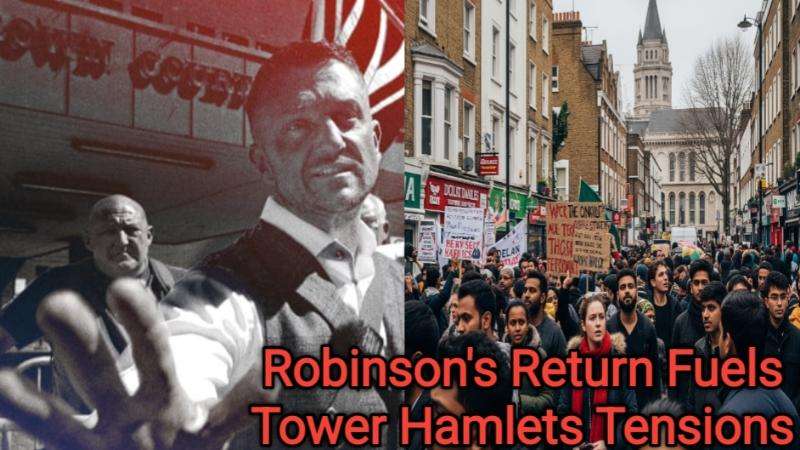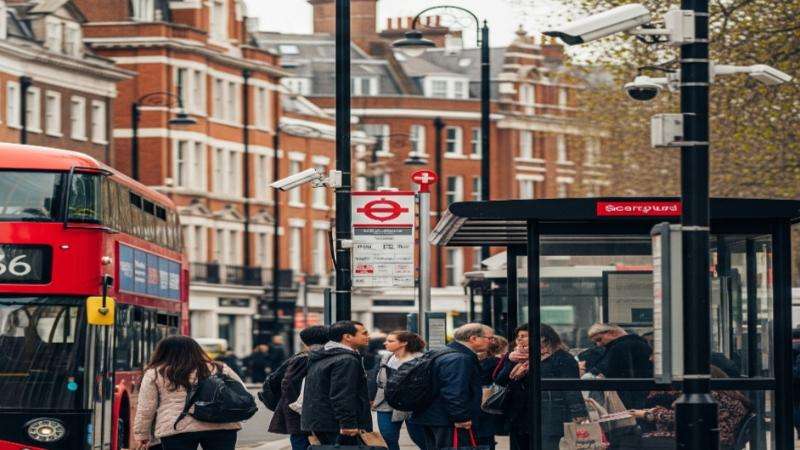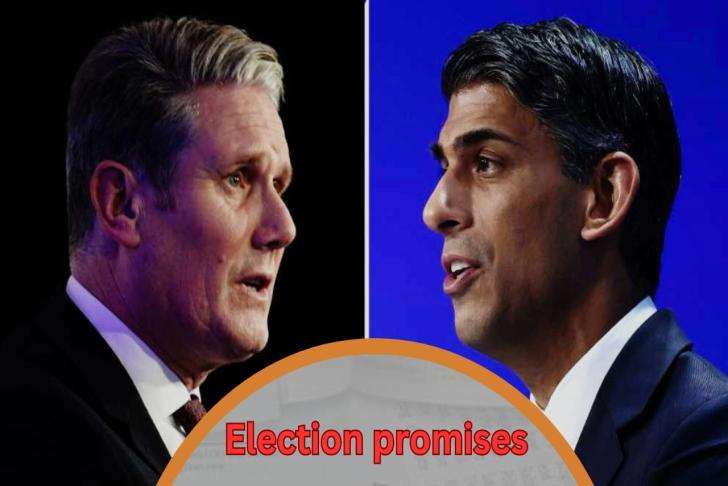Today, Rishi Sunak declared that there will be a sudden general election this summer.
It comes after the prime minister's official spokeswoman declined to rule out the possibility that a summer poll could be declared today, which intensified rumors about a surprise election.
I examine what might be included in the election manifestos of the Conservative and Labour parties ahead of the general election, taking into account the parties' prior promises.
What could the manifestos include?
Education
What Labour has pledged
Labour has outlined its plan to reform education, including one of the party’s key pledges to recruit 6,500 new teachers to the profession. The party has said recruitment would be targeted towards subjects like science and maths which face the most shortages.
The recruitment drive would be paid for by a policy to introduce 20 per cent VAT on private schools, estimated to raise up to £1.7bn for state education. The private schools policy would also pay for every school to have access to mental health counselling and for a national ‘oracy’ programme to improve early years speech and language, the party has said.
Shadow education secretary Brigit Philipson has highlighted worryingly high absence rates and vowed to bring them down by introducing breakfast clubs in primary schools and improving mental health support in schools.
The party has also promised to reform curriculum and assessment with a focus on valuing creative subjects as well as digital and speaking skills.
Labour has also promised to reform Ofsted by getting rid of single-word judgements in favour of a report card with more information about a school. The party has outlined a support-based approach to school inspections and suggested bringing in a yearly safeguarding check.
What the Conservatives have pledged
Rishi Sunak’s main education policy, outlined at the Tory party conference last year, was a promise to scrap A-Levels, replacing them with new exams. He revealed plans for an Advanced British Standard, bringing together academic A-Levels and technical T-Levels. This builds on his commitment to ensure all students study English and maths until the age of 18.
He described education as a “silver bullet” and acknowledged that the A-Level plans would require a recruitment drive. The Department for Education said teacher shortages are being addressed with a range of measures including teacher training bursaries and scholarships, as well as a a minimum £30,000 starting salary.
The PM has also outlined plans to expand free childcare, doubling the numbers of hours parents can claim for children aged nine months and older to 30 hours per week.
The Conservatives recently released new sex education guidance, with a consultation on plans to stop teaching sex education to children under nine, and a ban on teaching gender ideology entirely.
The Tories have also highlighted the need to improve attendance rates. Guidance for schools and local councils was set to be introduced from September and the party has also expanded a pilot of whole-family support workers to get children back into schools.
NHS
What Labour has pledged
Cutting NHS waiting lists by providing 40,000 more appointments each week – funded by tackling tax avoidance and non-dom loopholes – is one of six key pledges of the Labour party heading into the election, Sir Keir Starmer announced last week.
Labour will introduce a national NHS programme to carry out more operations, appointments and diagnostic tests during the evenings or at weekends, paying staff overtime rates to do extra shifts out of hours.
The party also wants to get the NHS “working differently”, by setting up shared waiting lists and collaboration between hospitals, and trialling Neighbourhood Health Centres, bringing together doctors, district nurses, care workers, physiotherapists, and mental health specialists under one roof.
It has also promised to reform primary care “to bring back the family doctor, harness the power of the NHS App to make it easier to get an appointment and reduce the workload on GPs by cutting red tape”.
Asked whether the step on NHS appointments could be called a promise despite lacking a specific time scale for delivery, he replied: “It is – from day one, minute one, we’ll be working to deliver it.”
He said that his party was already in discussions with doctors and that Labour would be able to increase appointments “pretty swiftly”.
On its website, Labour says it will be “the government that finally transforms our NHS to make it a service fit for today” promising to get the health service “back on its feet”.
Shadow Health Secretary Wes Streeting has said he would “hold the door wide open” to private sector entrepreneurs who can improve the NHS if the Labour party enter government. Mr Streeting said that he wants to get “quite tough on NHS England” to drive reform using new technologies and encourage the body to be more open to bringing private-sector companies into the health service.
Under Labour, new health technology would be tried at a single NHS trust before potentially being rolled out across the country, while the health service would collaborate more closely with the life sciences sector. Mr Streeting wants to do away with bureaucratic hurdles – such as having to trial new health technology at a single trust before a wider rollout – which would allow companies to deliver their innovations into the NHS much faster.
Mr Streeting also believes a centralised procurement system would help companies developing their technology and make the NHS work more efficiently, ultimately resulting in improved healthcare for patients.
Labour’s pledges on healthcare only apply to England as powers over these matters are devolved in Scotland, Wales and Northern Ireland. The party will make separate policy pledges for Scotland and Wales.
What the Conservatives have pledged
Within weeks of taking office, Rishi Sunak set out five pledges by which voters should judge his premiership, one of which was to slash NHS waiting lists. It would be difficult to describe that as pledge as having been fulfilled but waiting times in England have come down slightly in recent months.
It is highly likely the Prime Minister will head into the election on a promise to reduce those times further, particularly as he has repeatedly claimed his efforts so far have been hampered by strikes.
A new Conservative Government would build on the targets outlined in the NHS long-term workforce plan, with Mr Sunak having promised to recruit 300,000 doctors and 170,000 nurses by 2036-37. The expansion of medical school places so the NHS is less reliant on recruiting foreign staff is expected to continue.
On social care, the Tories will have to decide whether to recommit to introducing an £86,000 cap on the amount people will have to pay for care across their lifetimes. The limit was originally to come into force this October but its implementation has now been pushed back by Jeremy Hunt, the Chancellor, until after the election.
Boris Johnson had planned to pay for the policy by hiking National Insurance, but the tax rise was scrapped by Liz Truss, and Mr Sunak chose not to resurrect it.
Last week, the Government announced that patients would soon be able to benefit from the largest expansion of choice in a decade. Those requiring treatment outside of hospitals would be able to choose between multiple providers across the NHS and independent sector.
Pilots were set to commence from the autumn offering patients a choice of where they receive out-of-hospital care. Patient choice expansion would be tested in new areas across the country. Services that could be offered under the expansion include endoscopy, nutrition and podiatry.
Subject to the results of local pilots, the government and NHS intend to expand choice to many more areas of the country and many more services.
Greater use of Artificial Intelligence (AI) is also expected to feature in the Tories’ election manifesto based on recent announcements. Last October, Mr Sunak announced £100m investment in AI to tackle incurable diseases. And on Tuesday, he said “game-changing” AI technology would be rolled out to all radiography departments in England in weeks – backed by £15.5m in new Government funding.
The new system works by automatically reviewing a CT or MRI scan, helping doctors quickly distinguish between cancerous cells and healthy organs and to prevent healthy organs from being damaged during radiation treatment. Officials said cancer waiting times will fall thanks to new AI technology that locates cancer cells 2.5 times quicker than doctors alone.
Pensions
What the Conservatives have pledged
Under the triple lock system, the state pension increases each April, by whichever is highest of either inflation, average earnings, or 2.5 per cent.
The system was introduced by the Conservative-Liberal Democrat coalition government in 2010, to ensure the value of the state pension was not overtaken by the increase in the cost of living or the working population’s income.
In 2023, the average earnings rose more than the other two, with the state pensions increased by 8.5 per cent in April 2024.
Earlier in March, Chancellor Jeremy Hunt said if they win the next general election, the Conservatives would continue the triple-lock system, and was confident that the party would be able to afford the promise.
“We made that commitment to pensioners and we think it’s a very important one,” he told the BBC’s Sunday With Laura Kuenssberg programme.
But Hunt also recognised it was a “expensive commitment” that has to be maintained with public spending cuts and economic growth.
What Labour has pledged
Labour also said it was “committed to retaining” the triple lock.
The party’s National Policy Forum has also backed the triple lock, saying in its final policy document: “We will stand by increases to the state pension to protect pensioners from the cost of living crisis. Labour recognises the triple lock in how it has protected pensioners’ incomes and providing certainty in retirement.
“That is why Labour has defended the triple lock when the Conservatives have sought to break their promises,” stated the party’s final policy document.
Although Rishi Sunak and Keir Starmer have committed to the policy for the entirety of the next parliament, both parties have not made it clear about the triple lock in their manifesto.
The state pension cost £110.5bn in 2022-2023, and is currently worth £221.20 per week, or over £11,500 per year.
Transport
What Labour has pledged
If Labour was in power it would attempt to fix England’s bus crisis by effectively nationalising many services across the country in its first term of office, i previously revealed.
Louise Haigh, the shadow Transport Secretary, said that the plan would both create and save up to 1,300 bus routes, allowing 250 million more passenger journeys per year.
The pledge follows exclusive research from i showing 16 million miles of England’s bus routes have been axed since 2010.
It is hoped the move would make it easier for local authorities to take over failing transport companies.
Areas expected to be included in the plan due to underperforming services include Cambridgeshire, Liverpool, Peterborough and West Yorkshire.
What the Conservatives have pledged
In October Rishi Sunak promised the Government would spend billions on transport projects across the country after the northern leg of the HS2 high speed rail link was scrapped.
The Prime Minister said “every single penny” saved from cancelling the remainder of HS2, which he claims is £36bn, would be invested in the projects.
He added: “Every region outside of London will receive the same or more government investment than they would have done under HS2, with quicker results,” he said, although it is not clear when this money will be made available.
Mr Sunak said the plan would result in “hundreds” of alternative projects being funded, including upgrading the A1, the A2, the A5 and the M6, building the Midlands rail hub, connecting 50 stations and funding 72 road schemes.
Mr Sunak also said £12bn would be reserved to “better connect” Manchester and Liverpool, but that this wouldn’t necessarily be with high speed rail.


_4.jpg)





.svg)




